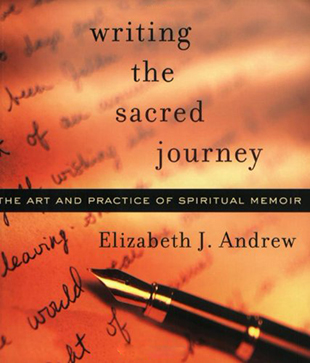Elizabeth J. Andrew teaches memoir, essay, and journal writing at the Loft Literary Center in Minneapolis, Minnesota. She is the author of On the Threshold: Home, Hardwood and Holiness. Here is the definitive handbook for those courageous souls taking on the creative and ethical challenge of writing a spiritual memoir. The author has already proven herself to be an imaginative literary stylist and a skilled practitioner of everyday spirituality. She also has an impressive knowledge of this genre of writing and an ability to draw out stirring passages from all that she has read in the field. Andrew states: "Spiritual memoir, then, is a genre in which one's life is written with particular attention paid to its mysteries. It uses the material of the past and present to ask, What is the source of my existence? What makes me tick? What gives me breath, hope, or inspiration? Invariably spiritual memoir places one's life in relationship to something greater, whether that something be God or oneness or the earth or death. Unlike literary memoir, the purpose of writing spiritual memoir is only secondarily to create a well-crafted work. Spiritual memoirists write because writing brings them nearer to the ineffable essence of life."
Andrew begins with reasons why people write spiritual memoirs and describes the attributes of this literary form. She then moves on to getting started, inevitable resistance, developing the writing habit, and organizing your memories. The author hits high stride in a section of the paperback titled "Your Spiritual Life as Subject Matter" where she covers symbols and metaphors, the vividness of childhood, being in the body, honoring teachers, journeys, the significance of seeing, sharing suffering, and the numinous. We especially liked her treatment of the power of epiphany: "The word epiphany joins two worlds: the spiritual and the literary. The moment when Christ appears to the Magi widens to include any divine manifestation and then widens further to include the revelation of anything's essential, awesome nature. Epiphanal moments are instances of numinosity, when a veil is dropped from our eyes and we know the world for what it is, rough-hewn and sparkling. Epiphanies stand out as touchstones, bright instances among vague memories that we can latch on to and write from. Inherent in epiphanies are movement and growth — the elements necessary to make any story gripping, When we work with our epiphanies, we encounter mystery." The last section of the book focuses on "The Craft of Writing" and analyzes learning to read as a writer, finding a structure for your story, revision as seeing anew, and the link between writing practice and spiritual practice. The bibliographic material at the end of this paperback presents a treasure trove of spiritual memoirs to read.
